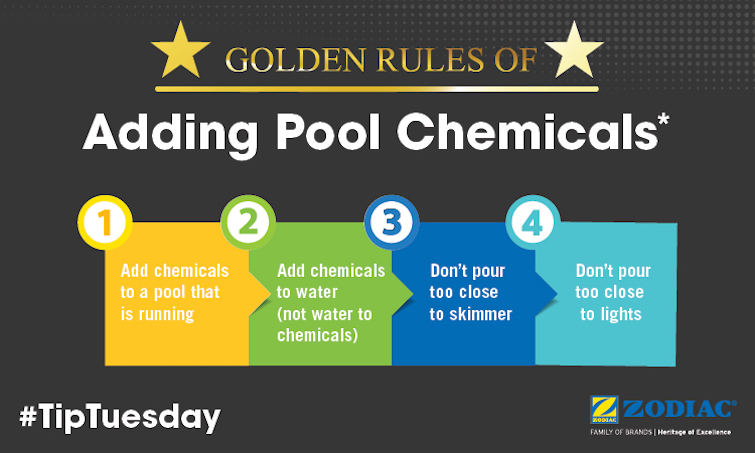Guide to Pool Chemicals
March 28, 2017 at 07:46 PM

Confused by the cocktail of chemicals your swimming pool requires day to day to keep the water clean and balanced? Get a quick overview below regarding the most used pool chemicals and their role in pool maintenance.
Chlorine. Probably the best-known pool chemical, chlorine is a sanitizer that keeps algae and bacteria at bay. It comes in liquid, powder, and tablet forms. When water reacts with chlorine, it forms hydrochloric acid, which is the compound that fights bacteria. Fun fact: when people talk about the “pool smell,” it’s mistaken as being caused by chlorine, but it’s really the lack of chlorine that’s creating the odor. That’s because when chlorine contacts organic matter such as skin and body oils, it creates byproducts that smell. That smell means existing chlorine has been depleted – and more is required.
Shock. Shocking a pool is the act of "unbinding" or oxidizing the inactive chlorine (chloramines). Shocking can be done with increased dosages of chlorine or MPS (sodium monopersulfate) non-chlorine shock. When added to the pool, whatever chemical is used starts a process called superchlorination. Shocking the pool helps kill all the bacteria and sanitizer byproducts. Usually sold as a separate product, shock is used about once a week or every two weeks, depending on pool usage.
Thiosulfate. If you’ve added too much chlorine into the pool but aren’t shocking it, you can neutralize some of the chlorine with thiosulfate.
Bromine. This is an alternative to chlorine, but typically used in warmer water such as that used in hot tubs. Because hot tubs tend to have a higher pH level (alkalinity), and bromine works better at a higher pH level, bromine is more effective in this type of environment.
Cyanuric acid. The sun’s ultraviolet rays can speed up the decomposition of chlorine in the water. Cyanuric acid – also known as sunscreen for chlorine – helps slow that process down by stabilizing, or protecting, the chlorine. However, there is a limit to the amount of cyanuric acid that can be in the pool: too much can also slow the destruction of bacteria. Some chlorine products come with cyanuric acid added; be sure to check before adding cyanuric acid separately.
pH balancers. Water balance is typically achieved when tested at a neutral level of 7.0. Below that means the water is on the acidic side; above means it’s alkaline. Ideal pH levels in a pool should be between 7.4-7.6. Pool chemicals will affect the water’s pH level, which requires the use of a pH balancer to bring it back to as close to neutral as possible.
The below explains what pH balancers do:
Baking soda, sodium carbonate – Increases the alkalinity; decreases acidity.
Muriatic acid, sodium bisulfate – Decreases alkalinity; increases acidity.
Calcium chloride. Your pool requires a minimum level of calcium hardness before molecules start to look elsewhere for its minerals and eat away at your tile and metal. Calcium chloride will increase calcium hardness.
Algaecide. Often copper-based, these polymers serve as a preventative barrier against algae. After the pool has been shocked, algaecide is added to keep the algae from returning.
Clarifier. These are polymers that coagulate particles in the water. They work by trapping particles in the filter. Clarifiers can be made of a number of different chemicals, including ammonium chloride, crab shell extracts, and enzymes.
Flocculent. Similar to a clarifier in that it attracts and bonds particles together, flocculents sink the particles to the pool floor instead of running them through a filter. For that reason, the filter needs to be off during those eight to 12 hours while the flocculent is at work. After the particles cover the bottom of the pool, they need to be vacuumed.
Please always be aware that chemicals should be locked away from children and animals, and stored separately. For proper handling and usage/dosage of pool chemicals, please refer to the appropriate manufacturer instructions. If you have questions, always call your pool service company.